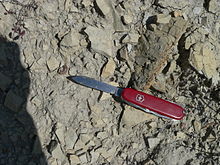marl


Mergel ( Old High German mergil , Latin marga ; according to Pliny Naturalis historia, originally from Gallic ) is a sedimentary rock . Strongly solidified deposits are also referred to as marlstone or marl rock . Marl has very different origins. It occurs when the fine material ( clay , silt ) is deposited and at the same time lime is precipitated or also deposited.
composition
The rock contains both lime and silicate components, mostly small grain sizes ( clay and / or silt ). Coarser material ( sand and gravel ) may be present. With a higher lime content one speaks of lime marl , with a high clay content of clay marl . Marl deposits, which include all grain size classes, are called diamictite in technical terms .
According to Carl Wilhelm Correns (1949), a distinction can be made between:
- high percentage limestone (up to 95% lime, 5% clay)
- marly lime (up to 85% lime, 15% clay)
- Marl lime (up to 75% lime, 25% clay)
- Lime marl (up to 65% lime, 35% clay)
- Marl (up to 35% lime, 65% clay)
- Clay marl (up to 25% lime, 75% clay)
- Marl clay (up to 15% lime, 85% clay)
- marly clay (up to 5% lime, 95% clay)
- high percentage clay (up to 0% lime, 100% clay)
Occurrence
Marl or marl stones are widespread and quite common worldwide. Well-known marl deposits in Central and Western Europe are located in South Limburg (the Netherlands), in particular the marl caves of Maastricht and Valkenburg aan de Geul are a local tourist attraction.
There are other large marl deposits in the Mainz Basin . In Austrian petrology , special local marl forms are also called Tegel .
In the Ruhr area, the marl boundary separates two areas of hard coal mining. To the north of the marl boundary, the coal mountains are covered by an increasingly thick layer of marl, which makes mining difficult.
Use of the marl
Marl is an important raw material for the manufacture of cement .
In agriculture, mainly dry wetlands ( moors and swamps ) were upgraded with marl in the past ; the lime neutralized the acidic soils, the clay stabilized the soft soil so that the fields could be walked on and driven on.
Emaciated soil
Since the marl brought visible earnings growth in the first years and premature sustainable soil fertilization was equated, but in reality the ground except lime no nutrients ( phosphates , nitrates charging thereto), if other fertilizer (were compost , manure , and later guano , superphosphate o . Ä.) The fields soon become sterile and drained - and therefore referred to as "emaciated".
The farmer's rule “Marl makes rich fathers and poor sons” indicates the difficulty with marl.
However, the verb ausmergeln is etymologically not related to marl . Rather, it is derived from Mark and originally meant "to take out the Mark", ie to "mark out". From this the meanings “emaciated”, “emaciated” and “exhausted” developed for emaciated . It was not until later that people spoke of “emaciated soils” and folk etymologically assumed a derivation of marl . The German dictionary of the Brothers Grimm devoted only a brief note to the phrase “to mar the ground”, which was still sparse at the time.
Viticulture
The Italian grape variety Nebbiolo only thrives on calcareous marl soils and there on steep south or south-west locations .
See also
- Glacial till
- Tute marl
- Melioration
- Scala dei Turchi , a rock formation made of white marl on the south coast of Sicily
Web links
Individual evidence
- ↑ See Duden online: Mergel
- ↑ Carl Wilhelm Correns: Introduction to Mineralogy (Crystallography and Petrology). Springer, Berlin 1949.
- ^ Christiane Martin (Red.): Lexicon of Geosciences , Volume 3, Spectrum Academic Publishing House, Heidelberg a. a. 2001, ISBN 3-8274-0422-3 , pp. 356 f.
- ↑ See Duden online: ausmergeln and Mark
- ↑ See Duden online: emaciated
- ↑ Deviating from the state of science, the linguist B. Liebich also pleaded in 1898 for marl > emaciated as the “closest derivation”, cf. Small contributions to German word research , in: Contributions to the history of German language and literature, Volume 1898, p. 223 ( online ).
- ^ German dictionary of the Brothers Grimm: ausmergeln .


